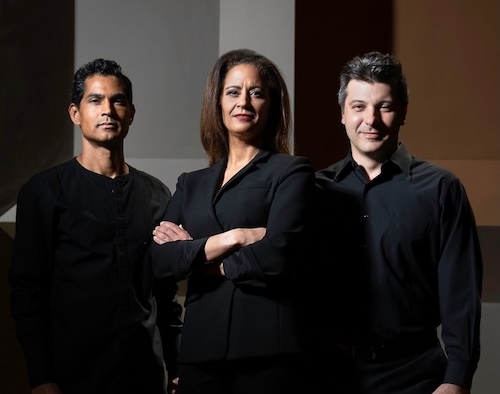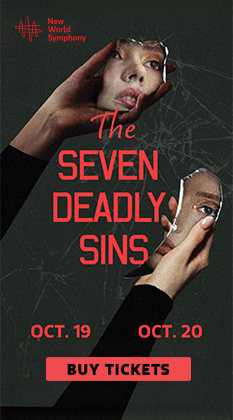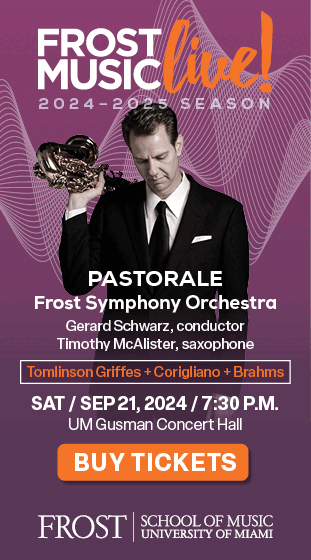Solidaire makes impressive debut with intelligent, wide-ranging program
The birth of Solidaire, a new chamber music trio with the offbeat configuration of flute, cello and percussion marked the concluding concert of the Frost Chamber Music Festival Saturday night at the University of Miami’s Newman Recital Hall.
Flutist Jennifer Grim, cellist Jeffrey Zeigler and percussionist Svet Stoyanov are the Solidaire members. The Frost faculty musicians offered the premiere of a new work written for this debut concert, a score by one of America’s iconic composers and three pieces that utilized the individual players in duos.
The trio opened with their own arrangement of, appropriately, Opening by Phillip Glass. First written for piano, this piece is vintage Glass in minimalist mode. The trio iarrangement gave the piece a more lyrical spin. The beauty of tone and agility of Grim’s flute carried much of Glass’s original keyboard scoring. Zeigler articulated the repetitive lines with precision and Stoyanov’s marimba added glints of color.
Mirrors for flute and cello, a 1979 score by Finnish composer Kaija Saariaho, displayed a distinctive sound world and a sense of moody desolation. As Zeigler explained in comments prior to the performance, Saariaho allowed the players to choose the order of her series of episodic cells. Grim and Zeigler chose to present the piece as it was played at its premiere. Grim was required to breathe into the instrument as well as play in a more conventional manner. With the flute passages often reaching into the instrument’s top range, her dexterity was marvelous.
Toru Takemitsu wrote Towards the Sea in 1981 on commission from the environmental activist group Greenpeace for their “Save the Whales” campaign. Initially scored for alto flute and guitar, the guitar part was later arranged for marimba which is how it is frequently presented.
A three-note sea motif runs through each of the three movements and was utilized in some of the composer’s other creations. The Japanese composer consistently displayed a personal voice that could not be confused with any other creative artist. That spark is vividly illustrated in the austere beauty of “The Night,” the suite’s opening movement. Darting figures and leaps take center stage in “Mobey-Dick” with the marimba’s busy role providing Takemitsu’s essential color palette. “Cape Cod” turns more rhythmic and directly melodic.
One could hardly imagine a more idiomatic reading than Grim and Stoyanov offered, and the entire work is a gem by one the most unique composers of the second half of the 20th century.
21 by Andy Akiho takes its impetus from Bach’s First Cello Suite and Trinidadian music. Like much of Akiho’s music, the brief work (for cello and percussion) is a pop fusion attempt. Akiho plays the steel pan so it was not surprising that he begins by having the percussionist strike the metal side of the marimba. Zeigler had to play a drum and clap in time in addition to attending to his cello. The vignette’s best moments come when the marimba suggests the sound of a Caribbean steel band. While there are engaging encounters along the way, Akiho’s work tends toward a diffuse trendiness. Almost constantly playing at a rapid clip, Zeigler and Stoyanov handled the challenges successfully.
The concert concluded with the premiere performance of The Six Seasons of Trees by Paola Prestini. The six-movement, 25-minute suite is an ode to nature and the environment in New York’s Catskill area and mountains.
Right from the opening section “Bare,” Prestini manages to mix alluring melodies in an almost traditional classical manner with modern harmonics that speak very much in terms of the present day. At times, the flute flutters in bird like utterances or resounds in jaunty lines. There are veiled suggestions of Bach and Baroque music from the cello. In “Fall” (the concluding segment), the trio produced an imposing sonority larger than their numbers. The movement’s haunting theme shows Prestini’s strong affinity for inspired melodies. The warmth and luster of Zeigler’s tone and his fleet bowing stood out in this vibrant rendition of a fine new work, and one looks forward to hearing more of this composer’s output.
The Solitaire players received repeated curtain calls for this ambitious debut program. Hopefully, more will be heard from this talented group.
Gerard Schwarz conducts the Frost Symphony Orchestra in Strauss’ Til Eulenspiegel’s Merry Pranks, Rachmaninoff’s Symphonic Dances, Bruch’s Kol Nidrei and a violin concerto TBA with Frost Concerto Competition winners. 7:30 p.m. March 30 at UM Gusman Concert Hall. music.um.edu
Posted in Performances
Leave a Comment
Sun Mar 24, 2024
at 11:45 am
No Comments


